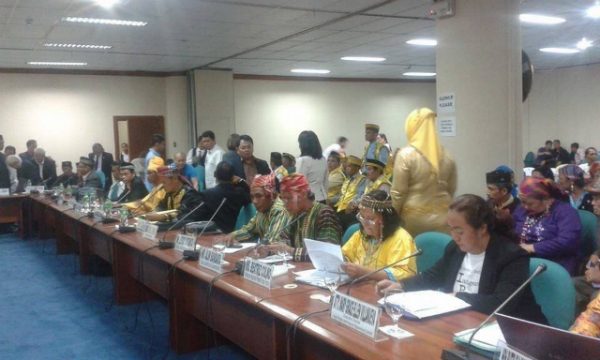SUMMARY
This is AI generated summarization, which may have errors. For context, always refer to the full article.

MANILA, Philippines – Representatives of non-Moro indigenous peoples (IP) trooped to the Senate on Monday, May 25 to call for the full recognition of Indigenous Peoples’ in the draft Bangsamoro Basic Law (BBL).
In a statement, the group recognized that the passage of a BBL as a critical step towards achieving peace. Yet, they branded as “discriminatory” the alleged non-inclusion of the non-Moro IP rights in the draft BBL version.
“We urge the members of the House of Congress and the Senate to not let historical, cultural and social justice elude the non–Moro Indigenous Peoples once again. As legislators tasked to enact this historic law, you hold the key for this new chapter in Philippine history to progress, and the responsibility to correct historical injustices. We demand careful and thorough deliberation of the draft BBL. The benefits and consequences of this law go beyond this generation,” read the statement.
Consisting of 40 partner-organizations, the delegation rallied against the proposed definition of “Bangsamoro People” in Article II of the bill because it diminished the distinct identity of non-Moro indigenous peoples by subsuming all the “natives or original inhabitants of Mindanao and the Sulu” and their “Spouses and their descendants” as Bangsamoro.
The group also called attention to the following provisions:
- Article II, Section 2 (Freedom of Choice), says that “other indigenous peoples” can choose their identity. However, as the Lumad leaders say, being Teduray, or Lambangian, or Erumanen Manuvu, is not a matter of choice, as one is born with one’s identity. The group says Republic Act 8371 or the Indigenous Peoples Rights Act (IPRA) clearly defines who the Indigenous Peoples are.
- Article V, Section 2 of the measure has been amended making the creation of policies on ancestral domains part of the concurrent powers shared by both the National Government and the Bangsamoro Government; but Article V, Section 3 (on Exclusive powers), maintains that the Bangsamoro Government shall exercise exclusive powers on Ancestral domain and Natural Resources.
- Article V, Section 4 (other Exclusive Powers) gives the Bangsamoro Government exclusive powers “to recognize, constructive or traditional possession of lands and resources by indigenous cultural communities subject to judicial affirmation.” The premise of judicial affirmation is that all lands are public lands. This effectively contradicts the recognition that some domains are ancestral hence private but collectively-owned, which is the basis for the issuance of Certificates of Ancestral Domain Titles or CADT.
The group nevertheless appealed for public support to uphold the rights of “non-Moro IP brothers and sisters,” during a joint hearing of the Senate Committees on Local Government; Peace, Unification, and Reconciliation, and the Senate Committee on Constitutional Amendments and the Revision of Codes.
The next BBL hearing is slated for June 3, with the participation of representatives of the affected local government units. – Rappler.com
Add a comment
How does this make you feel?
There are no comments yet. Add your comment to start the conversation.